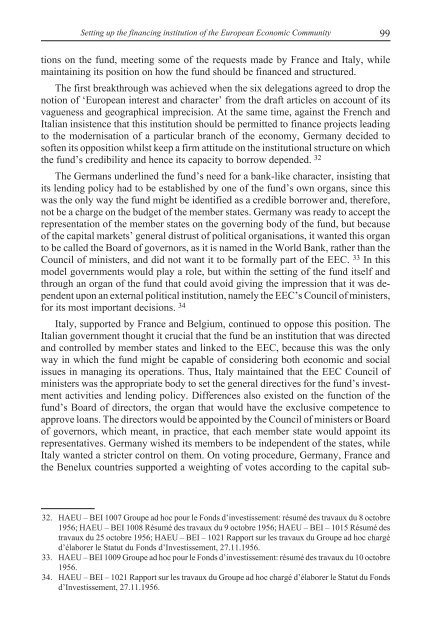Journal of European Integration History - Centre d'études et de ...
Journal of European Integration History - Centre d'études et de ...
Journal of European Integration History - Centre d'études et de ...
You also want an ePaper? Increase the reach of your titles
YUMPU automatically turns print PDFs into web optimized ePapers that Google loves.
S<strong>et</strong>ting up the financing institution <strong>of</strong> the <strong>European</strong> Economic Community 99<br />
tions on the fund, me<strong>et</strong>ing some <strong>of</strong> the requests ma<strong>de</strong> by France and Italy, while<br />
maintaining its position on how the fund should be financed and structured.<br />
The first breakthrough was achieved when the six <strong>de</strong>legations agreed to drop the<br />
notion <strong>of</strong> ‘<strong>European</strong> interest and character’ from the draft articles on account <strong>of</strong> its<br />
vagueness and geographical imprecision. At the same time, against the French and<br />
Italian insistence that this institution should be permitted to finance projects leading<br />
to the mo<strong>de</strong>rnisation <strong>of</strong> a particular branch <strong>of</strong> the economy, Germany <strong>de</strong>ci<strong>de</strong>d to<br />
s<strong>of</strong>ten its opposition whilst keep a firm attitu<strong>de</strong> on the institutional structure on which<br />
the fund’s credibility and hence its capacity to borrow <strong>de</strong>pen<strong>de</strong>d. 32<br />
The Germans un<strong>de</strong>rlined the fund’s need for a bank-like character, insisting that<br />
its lending policy had to be established by one <strong>of</strong> the fund’s own organs, since this<br />
was the only way the fund might be i<strong>de</strong>ntified as a credible borrower and, therefore,<br />
not be a charge on the budg<strong>et</strong> <strong>of</strong> the member states. Germany was ready to accept the<br />
representation <strong>of</strong> the member states on the governing body <strong>of</strong> the fund, but because<br />
<strong>of</strong> the capital mark<strong>et</strong>s’ general distrust <strong>of</strong> political organisations, it wanted this organ<br />
to be called the Board <strong>of</strong> governors, as it is named in the World Bank, rather than the<br />
Council <strong>of</strong> ministers, and did not want it to be formally part <strong>of</strong> the EEC. 33 In this<br />
mo<strong>de</strong>l governments would play a role, but within the s<strong>et</strong>ting <strong>of</strong> the fund itself and<br />
through an organ <strong>of</strong> the fund that could avoid giving the impression that it was <strong>de</strong>pen<strong>de</strong>nt<br />
upon an external political institution, namely the EEC’s Council <strong>of</strong> ministers,<br />
for its most important <strong>de</strong>cisions. 34<br />
Italy, supported by France and Belgium, continued to oppose this position. The<br />
Italian government thought it crucial that the fund be an institution that was directed<br />
and controlled by member states and linked to the EEC, because this was the only<br />
way in which the fund might be capable <strong>of</strong> consi<strong>de</strong>ring both economic and social<br />
issues in managing its operations. Thus, Italy maintained that the EEC Council <strong>of</strong><br />
ministers was the appropriate body to s<strong>et</strong> the general directives for the fund’s investment<br />
activities and lending policy. Differences also existed on the function <strong>of</strong> the<br />
fund’s Board <strong>of</strong> directors, the organ that would have the exclusive comp<strong>et</strong>ence to<br />
approve loans. The directors would be appointed by the Council <strong>of</strong> ministers or Board<br />
<strong>of</strong> governors, which meant, in practice, that each member state would appoint its<br />
representatives. Germany wished its members to be in<strong>de</strong>pen<strong>de</strong>nt <strong>of</strong> the states, while<br />
Italy wanted a stricter control on them. On voting procedure, Germany, France and<br />
the Benelux countries supported a weighting <strong>of</strong> votes according to the capital sub-<br />
32. HAEU – BEI 1007 Groupe ad hoc pour le Fonds d’investissement: résumé <strong>de</strong>s travaux du 8 octobre<br />
1956; HAEU – BEI 1008 Résumé <strong>de</strong>s travaux du 9 octobre 1956; HAEU – BEI – 1015 Résumé <strong>de</strong>s<br />
travaux du 25 octobre 1956; HAEU – BEI – 1021 Rapport sur les travaux du Groupe ad hoc chargé<br />
d’élaborer le Statut du Fonds d’Investissement, 27.11.1956.<br />
33. HAEU – BEI 1009 Groupe ad hoc pour le Fonds d’investissement: résumé <strong>de</strong>s travaux du 10 octobre<br />
1956.<br />
34. HAEU – BEI – 1021 Rapport sur les travaux du Groupe ad hoc chargé d’élaborer le Statut du Fonds<br />
d’Investissement, 27.11.1956.

















